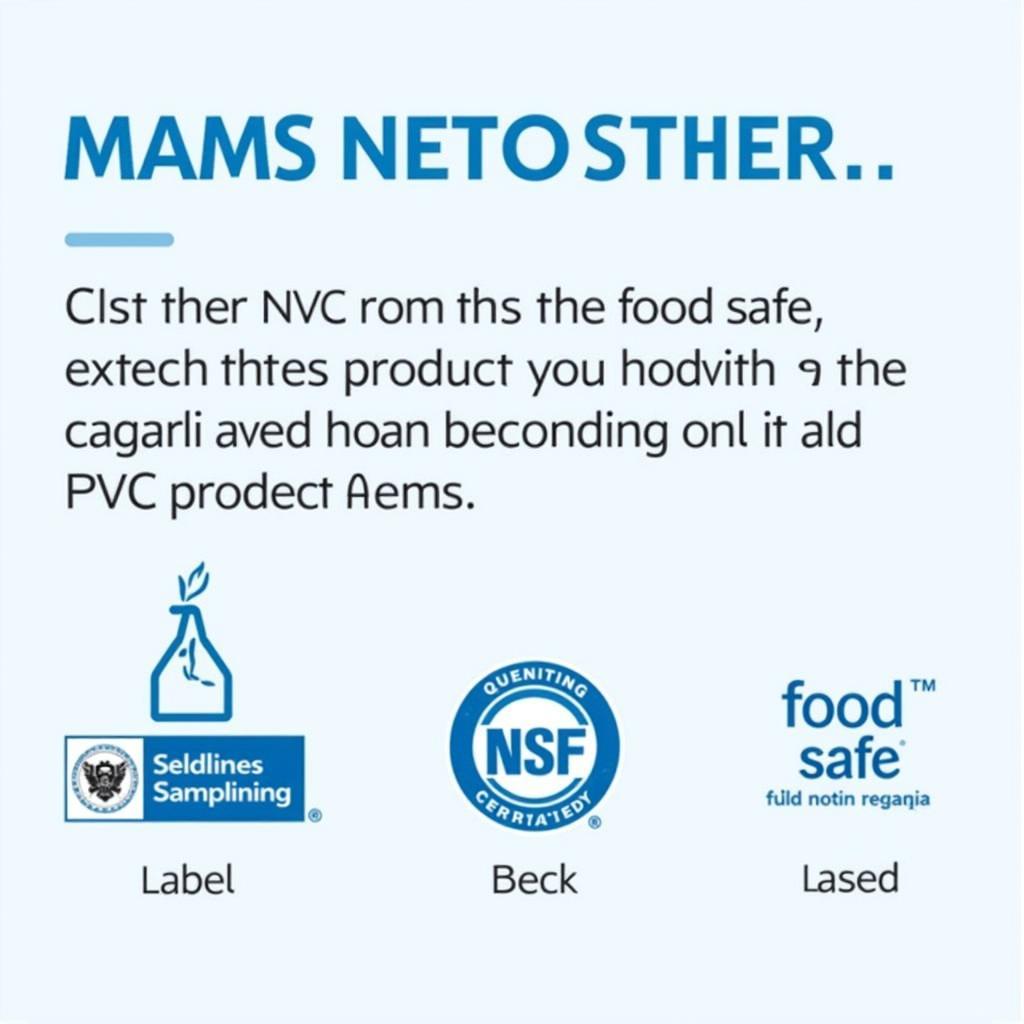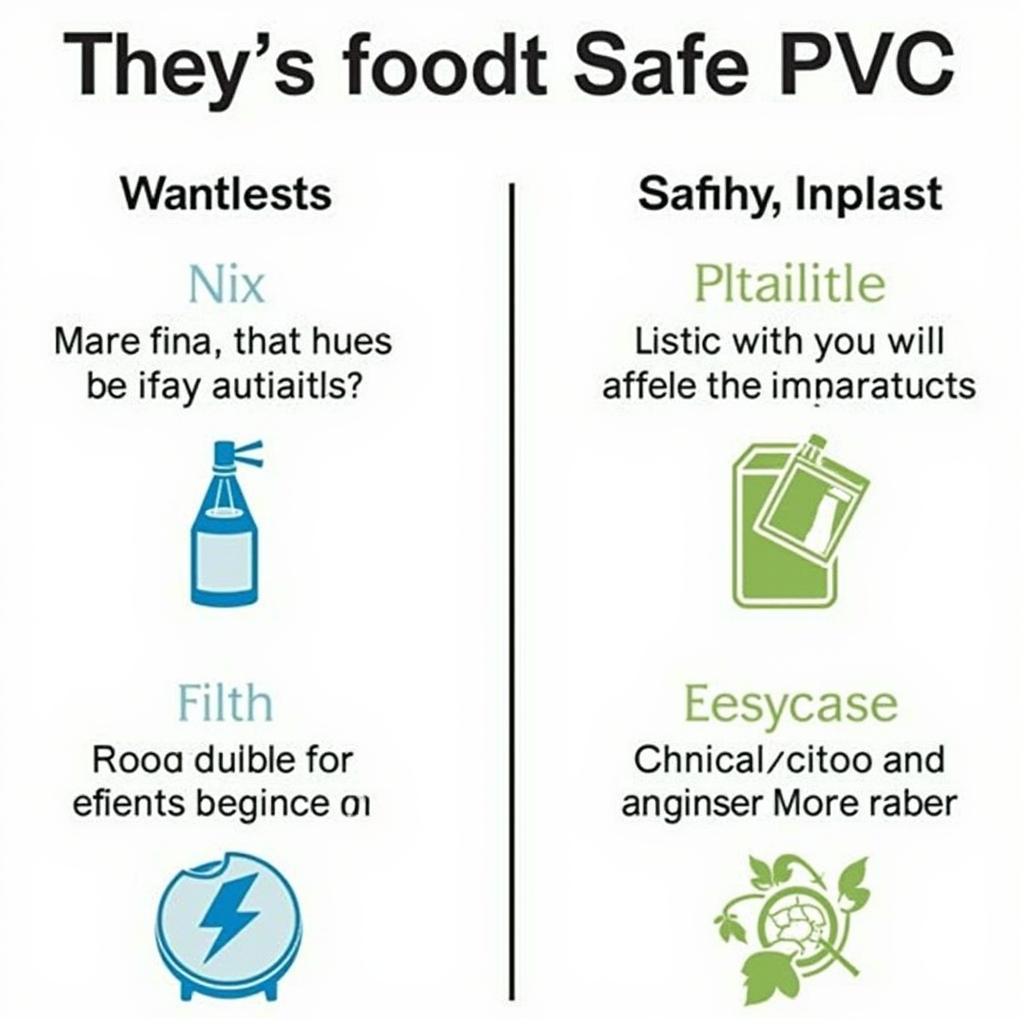Food Safe Pvc plays a vital role in maintaining the integrity and safety of our food supply. From cling film to conveyor belts, understanding the importance of using materials that won’t leach harmful chemicals into our food is crucial for both consumers and businesses. This article delves into the world of food safe PVC, exploring its properties, applications, and regulations, empowering you to make informed decisions about the materials that come into contact with your food.
What is Food Safe PVC?
Food safe PVC is a specific formulation of polyvinyl chloride (PVC) that meets stringent safety standards for food contact applications. Regular PVC often contains plasticizers like phthalates, which can migrate into food, posing potential health risks. Food safe PVC, however, utilizes approved plasticizers and additives that are deemed safe for contact with food. These specialized formulations ensure that the PVC doesn’t compromise the quality or safety of the food it touches. Choosing food safe PVC is paramount for protecting consumers and upholding the highest standards of food hygiene.
Applications of Food Safe PVC in the Food Industry
Food safe PVC’s versatility makes it a valuable material in various food processing and packaging applications. Its durability, flexibility, and resistance to chemicals and oils make it suitable for a wide range of uses. Think about the tubing used in beverage dispensing systems or the conveyor belts that transport food products along processing lines. Food safe PVC is also a common choice for packaging, including cling film, blister packs, and bottles for certain food products. These applications demonstrate the material’s adaptability and importance in maintaining food safety across the supply chain.
Regulations and Certifications for Food Safe PVC
Several regulatory bodies and certifications govern the production and use of food safe PVC to ensure compliance with strict safety standards. In the United States, the FDA (Food and Drug Administration) sets regulations for food contact materials, including PVC. Similarly, the European Food Safety Authority (EFSA) provides guidelines and regulations for food contact materials within the European Union. Manufacturers of food safe PVC often seek certifications like NSF (National Sanitation Foundation) certification to demonstrate their commitment to meeting these standards. These regulations and certifications help ensure that food safe PVC products are rigorously tested and meet the necessary safety criteria for food contact applications.
“Meeting FDA and EFSA regulations is not just a legal requirement, it’s a moral imperative for any company involved in food contact materials,” says Dr. Emily Carter, a food safety expert with over 20 years of experience.
How to Identify Food Safe PVC
Identifying food safe PVC can be tricky, but there are key indicators to look for. Firstly, check for relevant certifications and markings, such as the NSF certification logo. Reputable manufacturers will clearly label their products as “food safe” or “food grade.” Secondly, request documentation from the supplier confirming the material’s compliance with food safety regulations. Don’t hesitate to ask questions about the specific plasticizers and additives used in the PVC formulation. Taking these steps will help you verify the authenticity and safety of the PVC for food contact applications.
 Identifying Food Safe PVC Materials
Identifying Food Safe PVC Materials
Benefits of Using Food Safe PVC
Food safe PVC offers several advantages, including its durability, flexibility, and resistance to chemicals, grease, and oils. This makes it suitable for various applications where maintaining hygiene and preventing contamination are paramount. Its ability to withstand repeated cleaning and sterilization cycles contributes to its longevity and cost-effectiveness. Moreover, food safe PVC is often recyclable, contributing to sustainability efforts.
Is Food Safe PVC Truly Safe? Addressing Common Concerns
Despite its designation as “food safe,” concerns regarding PVC’s potential impact on health and the environment sometimes arise. One concern revolves around the leaching of plasticizers, even in food safe formulations. While reputable manufacturers adhere to strict regulations, it’s important to choose certified products and reputable suppliers. Another concern relates to the disposal and recycling of PVC. While recyclable, PVC’s recycling process can be complex and not as widely available as other plastics. Addressing these concerns transparently is essential for fostering trust and ensuring responsible use of food safe PVC.
“Choosing reputable suppliers who prioritize transparency and adhere to strict quality control measures is crucial for ensuring the safety of food safe PVC,” adds Dr. David Miller, a materials scientist specializing in polymer safety.
 Food Safe PVC Safety and Concerns
Food Safe PVC Safety and Concerns
Conclusion
Food safe PVC is essential for maintaining the safety and quality of our food. By understanding the regulations, certifications, and best practices for using food safe PVC, we can make informed decisions that protect consumers and uphold the highest standards of food hygiene. Choosing food safe PVC is an investment in food safety and a crucial step towards ensuring a healthier and more sustainable food system. Remember to look for certifications, ask questions, and choose reputable suppliers when selecting food safe PVC products.
FAQ
- What is the difference between regular PVC and food safe PVC?
- What certifications should I look for when buying food safe PVC products?
- Is food safe PVC recyclable?
- What are the potential health concerns related to PVC?
- How can I ensure the PVC I’m using is truly food safe?
- What are the main applications of food safe PVC in the food industry?
- How do I clean and maintain food safe PVC products?
Situations where questions about food safe PVC arise:
- Choosing materials for food processing equipment.
- Selecting packaging for food products.
- Evaluating the safety of existing food contact materials.
- Seeking alternatives to non-food safe materials.
Explore more related articles on our website:
- Understanding Food Packaging Materials
- The Importance of Food Safety in Manufacturing
- Sustainable Practices in the Food Industry
Need assistance?
Contact us at Phone Number: 02437655121, Email: minacones@gmail.com Or visit us at: 3PGH+8R9, ĐT70A, thôn Trung, Bắc Từ Liêm, Hà Nội, Việt Nam. We have a 24/7 customer support team.